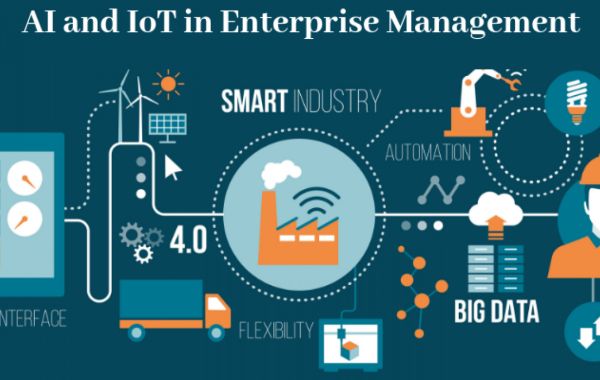In the current digital world, it’s essential for companies to operate efficiently by managing and organizing large amounts of enterprise content. This is the key point where Enterprise Content Management (ECM) systems are applied that offer a central platform for storage, organization and retrieval of documents as well as other digital assets. However, with rapid technological changes; specifically in Artificial Intelligence (AI); there has been a revolution in ECM software capabilities meant to better serve modern business needs.
Understanding ECM and the Arrival of AI
Enterprise Content Management System (ECMS) stands as a core element used to organize, manage and deliver important contents/documents in any given company. It plays a crucial role in aligning workflow processes while guaranteeing easy access to information. Traditionally, ECM systems required human intervention when it comes to activities like categorizing documents, entering data or even retrieving content which were not only time consuming but also prone to errors. By integrating Artificial Intelligence (AI) into ECMs; there is great progress achieved because now they can do more work with less energy so to say.
The incorporation of AI brings with it machine learning (ML), natural language processing (NLP) and advanced analytics thus completely changing how things work within enterprises regarding managing their documents digitally. These features enable the systems to classify files automatically based on their content, access relevant information from them or even understand what the whole document is about without needing any form of manual input except for supervision. Moreover, AI makes ECMS smart enough such that they can evolve over time through learning algorithms that adjust their accuracy and speed using different interactions as well as feedback from users.
AI integration in ECM solutions of this kind shows more than an improved level of technology, but rather a fundamental change in how organizations manage their knowledge assets. The shift from manual processes to automated and intelligent content management has set new standards for businesses in the age of digital transformation. What is gained by these improvements goes beyond mere operational efficiency; they also bring about better compliance with rules and regulations, stronger security measures, and enable companies to use their information more effectively when making strategic decisions. By becoming part of ECM systems, artificial intelligence will continue to change what we know as records keeping; it is becoming more dynamic so that predictions are possible while responding flexibly towards modern organizational requirements.
Automatic Content Sorting And Management
One characteristic feature AI adds into an ECM system is automating content sorting and management processes. The conventional way of arranging digital assets required human intervention at almost every step which was not only time consuming but also error prone due to its labor intensity. As far as this operation method is concerned there has been a complete overhaul brought by introduction artificial intelligence algorithms . These intricate tools can be used to deeply scrutinize any given piece of information; they then make conclusions such as patterns in texts or any other form depending on context provided either within document itself or through additional metadata like tags assigned by users during upload process etcetera. It is evidenced that this advancement frees workers from laborious task involving tagging each item individually while providing higher level precision than before even possible only through manual means thus guaranteeing more accurate results overall.
Besides saving time also ensures systematic organization thereby reducing retrieval times significantly because everything has been properly filed away already but most importantly accuracy with which data classified plays huge role towards maintaining integrity enterprise knowledgebase among other things.
When AI systems learn and adapt, they become more complex. They use the information they receive and the feedback from people to change their methods of categorizing things. They also keep up with what’s going on in the world so that they can always do what is best for a company. Because of this, it is very important to realize that business efficiency can be greatly improved through dynamic content management. It is also important for organizations to know that knowledge can be easily turned into something useful which will advance the company’s overall strategy. Intelligent automation within enterprise should treat its assets practically while getting finer grained over time towards user services; one example being this area is text categorisation done automatically.
Good To Read :- How Does ECM Software Enhance Document Security and Compliance?
Using AI-driven tools to improve search performance
AI tools have made ECM systems more searchable.With the help of such tools, users can easily access required information.By processing users' questions like humans do these tools are now able to understand any language thereby giving accurate results after finding relevant content to the questions asked which is significant as it means that a person will not have their time wasted looking through irrelevant documents|This development has led into systems been able provide better search experiences by preventing people from being bombarded with too much unnecessary data during the retrieval process.
Furthermore, artificial intelligence( AI) powered recommendation engines play an essential role in enhancing user experience within ECM platforms. These engines which are highly complex use data such as user behavior and preferences to suggest related materials.This way, they personalize the interaction between system users and themselves thereby saving time for the former while exposing them to content they would have missed out on when using traditional search methods.
The use of such AI-infused tools into ECM systems is a big step towards organizing and accessing data. Companies do this by making it easier to find information when needed. These organizations achieve this by simplifying searching through these systems so that every staff member only gets what is best suited for them at any given time thereby making the whole process faster in general than it would have been without such software and also ensuring engagement with work-related materials – something which may not occur if people have difficulty locating useful documents themselves or through others who they know have such knowledge/skills but may be unreachable due to various reasons. The level indicated shows effectiveness combined with individuality while highlighting change brought about by artificial intelligence on business content management.
Predictive analytics is critical in personalizing customer experiences, not only for strategic reasons. Understanding the preferences and behaviors of customers helps companies customize their services and communications so as to foster loyalty among them while promoting engagement too. For ECM, it means providing valuable and timely content that enhances overall user satisfaction.
With more advancements being made on this front each day, we can expect predictive analytics to be integrated into ECM systems at levels never seen before. This move will open up entirely new vistas for strategic planning and decision making because organizations will now have access to insights they never knew existed – thanks in large part to the technology that underpins such forecasting and foresight as AI.
Improving Security and Compliance through AI
Artificial intelligence (AI) is transforming security and compliance within Enterprise Content Management (ECM) platforms. AI equips ECM systems with the capability to proactively identify vulnerabilities and unauthorized attempts before they happen using intelligent algorithms thereby adding an extra layer of defense against potential data breaches. This not only protects sensitive information but also enables organizations to respond quickly should there be any threats thus preserving the integrity and confidentiality of their data assets.
AI also has a vital role to play in compliance management beyond just strengthening security measures. As laws governing storage and handling of data continue becoming stricter, AI algorithms come in handy for organizations trying to keep up with these legal complexities around regulatory requirements. By automatically scanning through contents while flagging those that may contravene set standards, it becomes easier for enterprises to stay compliant without requiring too much manual oversight which could be tiresome or error prone. This is particularly useful in industries where failure to adhere could attract hefty fines or even lead into courtroom battles that might drain company resources besides damaging its reputation before customers who value privacy highly.
Besides, machines impelled by artificial intelligence play a crucial role in adjusting to changing compliance environments. When fresh regulations get introduced while the former ones are modified, AI can be taught to detect and act on these changes so that efforts to observe them are always up to date and do not need constant manual intervention. It is not only about making regulatory compliance better that this ability brings but also enables organizations to manage uncertainties effectively within a dynamic legal context hence affirming the place of AI at the heart of modern ECM ecosystems.
Must Read :- Digital Transformation Strategy: Its 5 Key Components and Execution Plan
Challenges involved in Integrating AI with ECM Systems
Although integrating AI into ECM systems may promise operational efficiency and strategic insight, it has some challenges of its own. One of the first things that come to mind is data privacy concerns. In order for AI algorithms to learn and decide, they must have access to large amounts of information hence care should be taken so as not violate any privacy laws or ethical standards during this process. This worry does not only revolve around protecting sensitive data but also maintaining confidence among individuals whose records are under review.
Another major challenge lies in data quality. The success rate for these systems largely depends on how good input is. If what goes in is wrong; then expect output errors too – which can potentially lead one into making uninformed choices based on false premises Thus, within ECM platforms where such technologies will be employed there needs utmost attention paid towards ensuring that all records are accurate complete current etcetera because without doing this AI integration won’t work as anticipated.
Additionally, AI technologies are so complex that they require specialized skills. The shortage of AI expertise can be a barrier for organizations looking to integrate these abilities into their ECM systems. It’s difficult to find and keep people who know about content management as well as artificial intelligence.
Future Trends: AI and ECM Evolution
Besides, Artificial Intelligence (AI) is set to take Enterprise Content Management (ECM) to the next level in the coming years. There will be more user-friendly features created through expected advancements which will also make managing content easier. For example, there has been an increasing number of chatbots powered by AI that provide immediate help and guidance to users navigating through ECM platforms. These chatbots ensure a more interactive and responsive experience for the user whereby information is accessed quicker while queries are solved more efficiently than ever before.
Another thing is that content management will become more dynamic when creation and curation are automated using AI. Soon enough, systems of ECM would generate content based on what they believe their users want to see as well recommend materials for them depending on previous interactions thus vastly expanding available information sources among others.
Finally, seamless integration between current infrastructure and artificial intelligence systems calls for careful planning and execution. Issues such as compatibility, software restrictions or even customization needs can make this process quite challenging thus requiring coordination between business players and IT experts who should be able to overcome these technical obstacles effectively. These include the need to customize integrations due to software limitations; so many different systems requiring integration sometimes have conflicting requirements which may only be resolved through customization. Another issue may arise due to compatibility between various technologies e.g.; hardware components (such as servers), operating systems (OS) versions installed within client organizations’ networks etcetera
The advent of AI-driven virtual assistants for content management tasks represents yet another frontier in the evolution of ECM systems. These assistants are expected to take on a variety of roles, from guiding users through complex workflows to automating routine tasks, thereby enhancing productivity and allowing users to focus on more strategic activities.
These advancements signal a future where AI and ECM systems work in closer harmony, not just as tools for managing content but as intelligent partners that enhance the way organizations interact with their digital assets.
Achieve excellence with AI! Discover Best AI Development Services in India for your business needs!
Wrapping up
As we conclude, the transformative impact of Artificial Intelligence on Enterprise Content Management systems presents a new paradigm in business operations. AI's role transcends mere operational enhancements, heralding a new era where efficiency, strategic insight, and user engagement are significantly elevated. AI empowers ECM systems to deliver unprecedented value through the intelligent automation of tasks, refined search capabilities, and predictive analytics. As organizations navigate the evolving digital landscape, embracing AI technologies emerges as a strategic imperative to unlock the full capabilities of ECM software.
Collaborating with leading Best AI Development Services in India, especially those recognized as the best in regions like India, can provide businesses with the expertise and technological edge needed to harness AI's potential effectively. In doing so, companies not only optimize their content management practices but also position themselves to capitalize on the strategic opportunities AI brings to the forefront of enterprise content management. The journey of AI and ECM is just beginning, with future advancements poised to further revolutionize how businesses manage and leverage their digital assets for competitive advantage.







